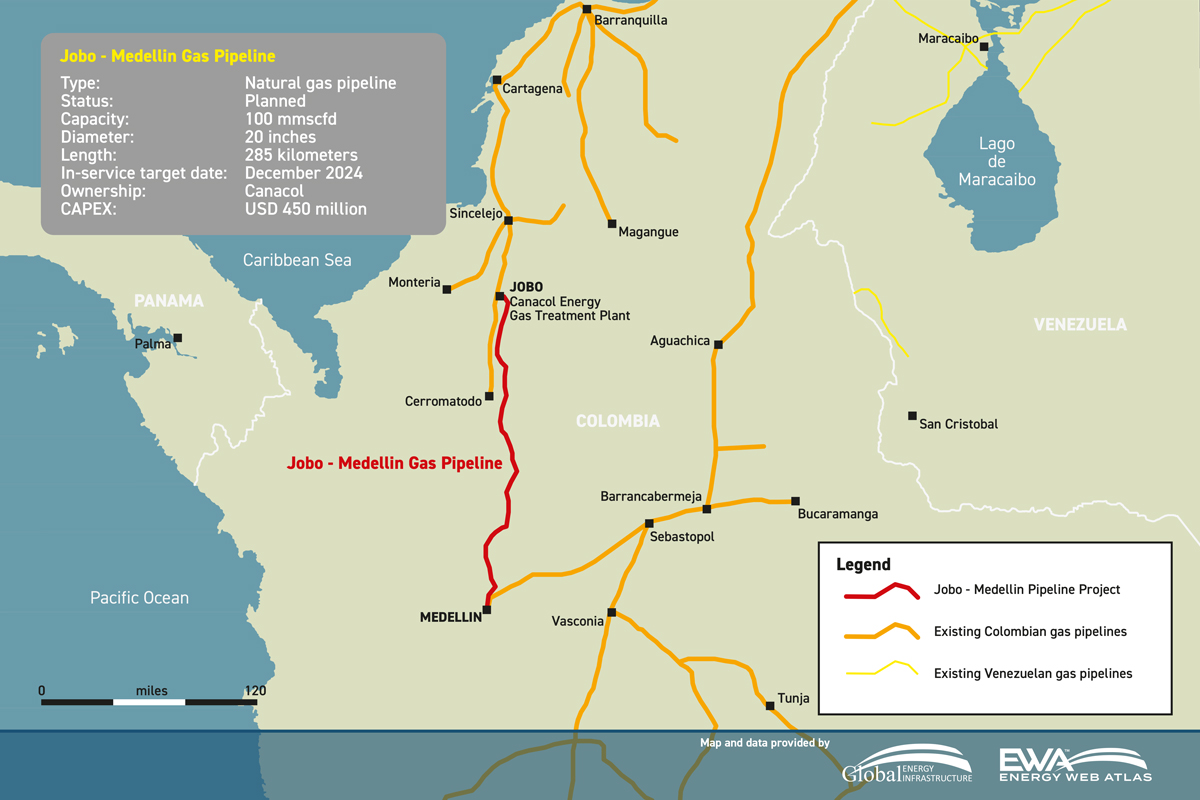Canacol Nears Construction Phase for $560 Million Colombian Gas Pipeline Project
By Mary Holcomb, Digital Editor
Colombian gas producer Canacol is on track to begin construction on the Jobo-Medellín natural gas pipeline having received final binding offers from four interested contractors in March.
The 300-km (186-mile) pipeline is expected to begin operating by December 2024, initially transporting 100 million cubic feet a day (MMcf/d) from natural gas fields near the Caribbean coast to Colombia's second largest city.
"We have four offers under evaluation," Canacol CEO Charle Gamba told investors during a quarterly earnings call, adding that he plans to make a final decision on a contractor by July 2022.
Gamba said he will base his decision on the shipping price proposed by bidders.
"They are all highly qualified companies," he said. "Our driver is the transportation tariff. The contractor will build the pipeline and will be expecting a return on investment of 14% or 15%. Our interest is in how much it costs to transport the gas from Jobo to Medellín."
All bids under consideration are build, own, operate, maintain agreements, with Canacol not planning to take a stake in the project.
“Canacol cannot legally own more than 25% of the pipeline,” the company said in an investor presentation. “Our intention is to own from 0%-25% depending on the terms of the winning consortium.”
The company expects the pipeline to cost $560 million.
In August 2021, Canacol signed a natural gas supply deal with Empresas Públicas de Medellín (EPM) for 55 MMcf/d of gas from December 2024 to November 30, 2035.
"The execution of this supply contract with EPM marks an important milestone in the history of our company, as it connects Canacol Energy with the interior market for the first time, diversifying our customer base and geographical exposure, as well as providing significant growth in natural gas sales,” Gamba said.
The company is currently under negotiation with three other large gas distributors to secure additional offtake agreements for the remaining 46 MMcf/d of capacity.
A subsequent phase contemplated for the pipeline project will have the ability to increase total transportation capacity to approximately 200 MMcf/d via the installation of additional compression.
Promigas, a company that is primarily engaged in transportation and distribution of natural gas, was among the interested parties in bidding for a contract to build and operate the pipeline.
"Through an open [tender] process, Promigas proposes the development of a gas pipeline that interconnects the coast [with the] interior, providing reliability of supply," the Barranquilla-based company said in a quarterly presentation in November 2021.
"[This is] a strategic interconnection for the supply of natural gas from the fields of the Lower Magdalena Valley with the markets Antioquia [department] and the country's interior."
Beyond Medellin, the pipeline will make Canacol’s gas available to consumers in Bogota, Cali, and other regional markets, allow the producer to meet 30% of Colombia's gas demand.
Initially, the company proposed three alternative routes for the pipeline project, according to permitting documents seen by BNamericas.
The first western-most option would span 329 km (204 miles), the second central-most alternative would measure 278 km (172 miles), and the third proposed corridor would stretch for 339 km (210 miles) along the eastern boundary of the area.
The pipeline – slated to be one of Colombia's largest energy infrastructure projects – will boast pressure capacity of up to 1200 pounds per square inch gauge and will be made of carbon steel with a 20-inch diameter.
Related News
Related News

- Keystone Oil Pipeline Resumes Operations After Temporary Shutdown
- Biden Administration Buys Oil for Emergency Reserve Above Target Price
- Freeport LNG Plant Runs Near Zero Consumption for Fifth Day
- Enbridge to Invest $500 Million in Pipeline Assets, Including Expansion of 850-Mile Gray Oak Pipeline
- Williams Delays Louisiana Pipeline Project Amid Dispute with Competitor Energy Transfer
- Evacuation Technologies to Reduce Methane Releases During Pigging
- Editor’s Notebook: Nord Stream’s $20 Billion Question
- Enbridge Receives Approval to Begin Service on Louisiana Venice Gas Pipeline Project
- Mexico Seizes Air Liquide's Hydrogen Plant at Pemex Refinery
- Russian LNG Unfazed By U.S. Sanctions





Comments